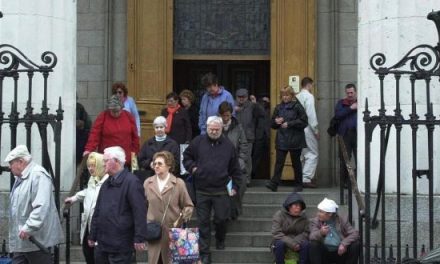By now most of us have probably heard about the Steubenville rape and its ongoing media attention. (For an interesting video discussion of the issue see here.) A couple weeks ago when people were focused quite a bit on the rape case in India, I read more than a couple of pieces that seemed to suggest that sexual assault case happened because of stuff that hadn’t been fixed in Indian society at large – but “obviously” (the American subtext seemed to be) that wouldn’t happen here!
The Steubenville case should, of course, remind us otherwise. Rape happens a lot in our Western culture – and I think in an era of hookups and easy sexual meetings especially with alcohol, it may even be more difficult for people to distinguish what counts as rape, and therefore easier for rape to happen. The college student depicted on the video who refers to the “dead girl” is, I think, reiterating some of the same kinds of behavior that students see every weekend on college campuses across the country. Donna Freitas’ excellent book Sex and the Soul discusses hook-up culture in her book; it is clear in reading that book that “consensual sex” in hook ups is a very, very thin line – and in addition, even when sex has been consensual, women and men both find themselves angry, frustrated and sad by the pressures of college sexual culture. I think the Steubenville case is thus a very horrific example of what happens all too often.
Just for the record: Catholic teaching is wholly against rape – it is an intrinsically evil and grave act, regardless of where or to whom it happens. I have students who seem to think that rape in marriage is okay – but marital rape is also gravely evil.
Yet what I want to discuss briefly in the rest of this post is the way in which social media meshes with youth rape culture in ways that need to be dealt with much, much more.
1. There are two moral problems here – interconnected but distinct.
One is what I might call a “traditional moral problem”: the rape itself, which has been and continues to be terrible and a social problem we need to deal with. We’ve got a lot of work to do in terms of educating people about when and why rape happens, and how to prevent rape.
But the other is the use of social media in connection with the rape and what that means in terms of exacerbating the crime. Several people have asked me (in part because of my work on the internet and theology) why youth would record and use social media in a case like this. I think that social media is, for many, just part of the way the world IS. Just as we mind-numbingly tweet what we eat for breakfast, and take pictures of the mundane places we visit – so this rape ended up being seen as “part of the day” in terms of its recordability.
The fact that people recorded this isn’t, by itself, unique – people have written about sexual assault in pre-technological age days as well. But it is the way in which it was written about and recorded that is unique.
2. Social media lends itself (falsely) to a kind of anonymity and that is the cause of the other moral question. Sherry Turkle even suggests that we begin to treat each other as objects in our social media use – we treat each other as robots. (See her terrific book here.)
The video and quotes captured suggest a kind of anonymity as well as devil-may-care feeling on the part of the perpetrators. That comes both from a youth sexual culture that acedes to sexual violence (in part because kids don’t know what to do in the face of such violence except to accept it as “normal”) as well as a social media culture that expects people to treat each other as anonymous, almost non-human beings.
So, I think the social media aspect highlights and accelerates the already existing problem of rape and rape culture- which is that we all, youth or not, tend to be unreflective about sexual culture and our participation in it – social media enables us to be even less reflective because it gets normalized. This was evident in the way that only later did the students involved curb themselves and try to erase what they had done.
3. That said, of course one of the things the students discovered here is that online interaction is not, in fact “anonymous.” It’s telling that the hacker group Anonymous in this case physically represents the kind of anonymity that people tend to perceive in their online useage. Anonymous was able to circumvent the anonymity of the online interactions by bringing them to light. It’s also ironic that perhaps Anonymous is able to transcend some social media problems not only by hacking, but also by using “real life” as a place to stage anonymity but also be a physical presence with which people have to deal. Having to have physical interactions with people does change those relationships. (Higher ed studies have suggested that master’s and doctoral students, for example, are far more likely to finish their theses and dissertations in offline programs because of the face-to-face contact.)
I don’t think ultimately that anonymity – whether IRL or online – is a help for human relationships and for dealing with rape. Anonymity permits people to treat each other like objects in very heightened ways. I’m likewise concerned about the ways in which our justice system might be hampered by actions from groups like Anonymous. So I have mixed feelings about Anonymous’ means of going about their work.
4. In conclusion, I wonder: are there ways, then, that we might use physical presence and a lack of anonymity to best respond to these kind of cases? Unfortunately I do not think that this is the last time we will be confronted with a social media and crime case – nor is it the last time we’ll be asked to think about the question of whether social media makes a crime a bit different. I think it does, obviously. And I invite further reflection on this.





As mom of a 16 year old daughter I can tell you that girls, teenage girls are extremely naive even when worldly or as intelligent as my daughter. Since these type of cases happen much too often, I’ve taken opportunities to highlight them to her and discuss them. To my horror, my daughter’s contribution to our discussion too often ends up like this: “Well, those girls have to be S-uts. My friends wouldn’t do that. My friends wouldn’t leave me passed out somewhere. My guy friends aren’t perverts, they wouldn’t do that to me.” When I add that if she takes anything and she overdoses that she will most likely die because her friends aren’t going to hang around to get in trouble, they’ll leave her where she lies. to which she didn’t answer, she just laughed. That’s the girls’ perspective. the guy’s perspective is this: (I have teenage boy co-workers) If the girls had any self respect they wouldn’t put themselves in that position to begin with, since they don’t it means they’re OK with whatever happens. Plus, they wouldn’t be hanging out with boys unless they like them. You see boys project their point of view unto girls, most guys have sexual thoughts about all the females they encounter…some are as fleeting as “yeah, I would do her, or man I’d have to be drunk to hit that” but ehy all think about sex with all the females they see. Girls don’t. Girls think about things like, If we had a baby it would look so cute! which is not the same thing.
BUT the real problem of rape is men’s total lack of respect for women. Unconscious does not mean consent. WEAKER, doesn’t give men the right. Some girls don’t have self-respect, but that doesn’t give men the right to use and abuse them. Boys forget where they come from, Eve, the Virgin Mary, and their mom’s. Some mom’s cause the damage, they show boys that women are things to not be respected, they do this by their actions or lack of action. Meaning, a mom whose love life is a revolving door, who doesn’t think twice about bringing men home to spend the night when their kids are in the same room. Moms who let men take advantage of them, moms who let their husbands mistreat them, moms who stay with men who mistreat their children. Moms who forget to show their sons affection and who forget to be strong in front of their sons. And then there are those fathers who miserably fail at being good role models, emphasis on fail.
Sometimes even religion fails to show us the right way too. Our church sometimes gets it wrong, let me just give you a couple of recent examples: (But I won’t go into what many anti-Catholics see our priests as.)
(1) Father Piero Corsi an Italian priest who wrote in his Christmas bulletin that women are to blame for domestic violence. Father Corsi’s letter, pinned to the door of the church in the northern village of San Terenzo di Lerici, said: “Let’s ask ourselves. Is it possible that men have all gone mad at one stroke? We don’t think so. The core of the problem is in the fact that women are more and more provocative, they yield to arrogance, they believe they can do everything themselves and they end up exacerbating tensions. How often do we see girls and even mature women walking on the streets in provocative and tight clothing? Babies left to themselves, dirty houses, cold meals and fast food at home, soiled clothes.”
(2) Bill Donohue, president of the Catholic League, issued a statement defending Father Benedict Groeschel, who blamed child victims of pedophile priests for their rapes. (If anyone wants to check out how far he went with it they can go look it up.)
As far as society as a whole, that’s blatantly obvious. Our digital age, that just give us access to information that was way out of reach just a decade ago. And like the saying goes, if you live by the sword you’ll die by the sword. Those who post their antics online shouldn’t cry foul when it comes bite to bite them on their behinds. Those kids in Steubenville weren’t at all thinking they were anonymous, their own Facebook accounts were used to distribute slanders against the girl. Their twitter accounts were also used, those are not anonymous, their cell phones…they live in a small town and kids these days don’t talk to each other like they used to, texting is how they talk. Most conversations between teens happen after school on FB, tweeter, & texts. The only way to fix this would be to obliterate communications. That or as soon as they walk in from school; homes would then have to become social media free zones…I doubt that would ever happen.